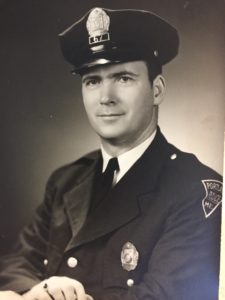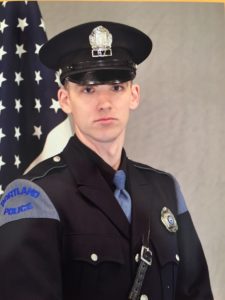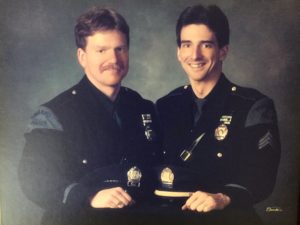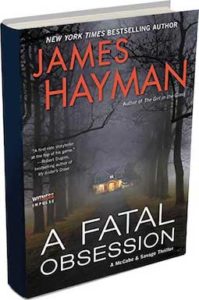The Story of Tom Joyce:
Tuesday, July 31st, 2018James Hayman: Whenever I do readings from one of my books at a library or bookstore, I’m frequently asked by someone in the audience how I learned about police procedures in general and about the Portland Police Department in particular. The answer is simple. Before starting to write my first thriller, The Cutting, I called the PPD and told the woman who answered the phone I was working on a novel featuring a pair of Portland, Maine detectives. I asked her if there was anyone knowledgeable about the department who could help educate me. She said, “I know just the right guy. He’s a detective sergeant who recently retired from the department. His name is Tom Joyce.”
I called Tom and set up a meeting and he’s been both my friend as well as my source for information about police work ever since. After learning that Tom’s grandfather, father, brother and uncle preceded him in the PPD and that his son has started his own career, I asked Tom if he’d be willing to write about his life for my blog. He graciously agreed. Here he is in his own words:
Tom: I find it interesting how one person’s life path finds its way to intersect with another person’s path. I first met Jim Hayman a few years after starting my second career in 2004 as a professor in the Criminal Justice Department at Southern Maine Community College.
Before I move forward in time from that point I think it appropriate to give a little history from my life path that put me on an intersecting course with Jim’s My grandparents on my father’s side immigrated from Ireland to the United States. Delia and Patrick Joyce left Ireland for a better life. Making their way to Portland, Maine they eventually had children- my father Tom, John and Catherine.
Although my grandfather was affiliated with the Portland Police Department for a brief period, my father and uncle both made it a career, joining the department shortly after WWII and retiring in the 1970’s. My father retired as a detective, my uncle as a captain.
Three years after my father retired from the department I was sworn in as a Portland police officer in 1979. I worked as a crime scene technician and eventually was promoted to sergeant and then assigned as a detective sergeant in the criminal investigation division. I also was responsible for the department’s crime laboratory.
I retired in 2004 to take a full-time teaching position at Southern Maine Community College. I am fortunate to have the opportunity to share with students my knowledge and experience so that they may realize their aspirations of working in the criminal justice system. It is wonderful and rewarding to see my students go onto successful careers in the field.
This spring my youngest son Alexander Patrick Joyce was sworn in as a Portland Police officer and wears badge number 67. That is the same number that my father, brother and I all wore during our time serving on the department. The tradition lives on.
As a detective sergeant, one of the most interesting cases I worked on was the murder of Amy St. Laurent in 2001. What started as a missing person case with suspicious aspects developed into a murder investigation. The investigation illustrates the cooperation among multiple law enforcement agencies and how good old fashion police work absent much forensic evidence brought a killer to justice. A book on one investigation I worked was memorialized in the book, “Finding Amy”, written by author Kate Flora and Portland’s one time Assistant Police Chief Joe Loughlin. The book tells a lot about how the Portland Police operate. I should mention that two of the investigators who deserve most of the credit for advancing this case to the ultimate conviction of the man responsible for Amy’s death were Portland Police Detective Daniel Young and Detective Scott Harakles of the Maine State Police.
One of the things I’ve discussed with Jim over the years is how criminal investigation is really both an art and a science. On the science side forensics can be a much simpler tool to use in solving crimes than obtaining truthful statements from victims, witnesses and/or suspects. Physical evidence does not pick sides, it just sits there and, provided it is properly examined and analyzed, it can shed significant insight into what really happened. Get a DNA match, or a fingerprint match and it’s usually game over at that point.
On the other hand, getting the truth about a crime out of people, especially ones who would rather not give it, can be a challenge. Which is where the art of interrogation comes into play. My father often said, “All the actors are not in Hollywood”. What he meant was that as a police officer he ran into “actors” during his investigations. Victims, witness and suspects in his investigations at one time or another all lied to him. If you are going to lie you need to sell it, you need to be a good actor. Suspects try to lie their way out of the situation they have gotten themselves into. Some are better actors than others. “So-called witnesses also lie to the police often to help out a buddy who committed some type of crime. And then there are the phony victims. For example, I once dealt with a so-called victim who swore up and down that he had been robbed and his weekly work pay stolen. It took persistent questioning to reveal that he was lying and that the whole robbery story was false. What really happened was that our so-called “victim” had blown a good portion of his pay at a bar and needed an excuse to tell his landlord since the rent was due and he was a little short on cash. Filing a false police report of a crime is itself a crime in Maine.
After I retired from the police department in 2004 I became a full-time teacher of Criminal Justice at Southern Maine Community College. One day I got a telephone call in my office at S.M.C.C. from a man by the name of Jim Hayman who said he was in the process of writing a book and asked if I would be willing to help him with background information. Jim was doing his homework on the Portland Police Department and how real life criminal investigations are handled. He wanted to know specifics on how the department operated and particularly the criminal investigation division. He was looking for information and insight concerning criminal investigation. Like most police officers I was more than willing to share with Jim my knowledge and experience on the department and all aspects of police work. All too often folks get a distorted perspective watching those police shows on TV. The majority of police officers want the public to know the ins and outs of how they do their job. It helps in building a positive relationship between the public and police.
Anyway, after I agreed to help we set up a date and talked. Jim’s novel centered on the fictional adventures of Detective Sergeant Michael McCabe who worked at the Portland Police Department and by coincidence held the same exact position I once did in the detective bureau. Jim asked a lot of questions and I did my best to answer them. As a result I believe the character of McCabe accurately reflects both the personal and professional issues a real officer might experience and have to handle.
As a retired officer, it was refreshing to have an author like Jim who was willing do his homework with the goal of portraying police work as it is actually done. I have commended Jim on this point on more than one occasion over the years.
As the years passed by and Jim wrote a series of stories based on the McCabe character, we have continued to stay in touch and have developed a good friendship. And when he has questions concerning police work I’m still more than happy to answer his questions. I appreciate his reaching out in order to put a real-life police perspective into his stories. I wish him the best of luck on his upcoming books.
And please don’t forget to look for James Hayman’s latest McCabe/Savage thriller, A Fatal Obsession, coming out on August 21st and available for preorder now!
Follow Jim on Twitter or Facebook for more details!
(Images courtesy of Tom Joyce)




